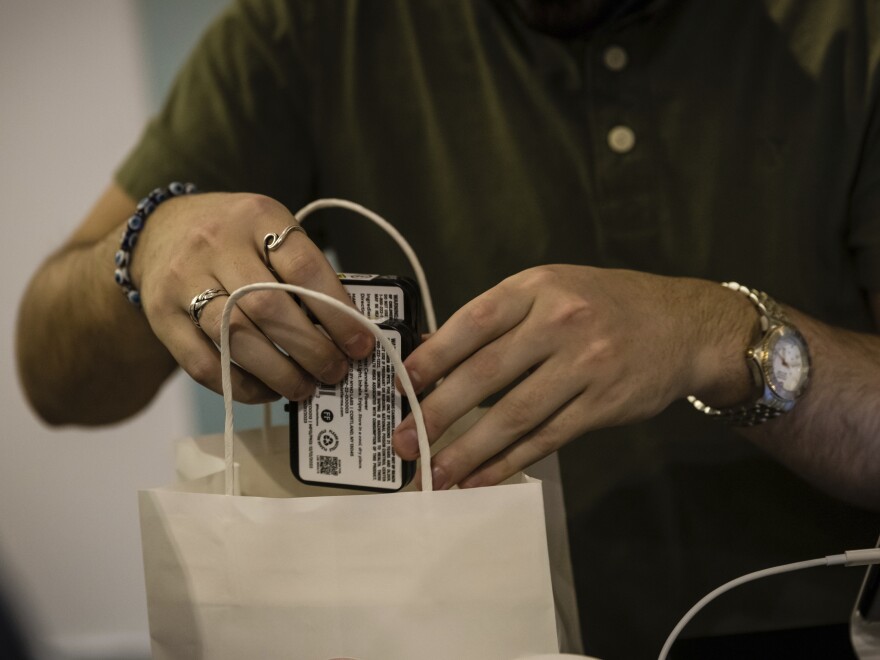Dozens of cannabis dispensaries across New York City are facing the prospect of having to close and find new locations after state regulators informed them this week that they were mistakenly allowed to open too close to schools.
A total of 108 licensed cannabis businesses are affected statewide so far, including 89 in New York City, according to a list Gothamist obtained from the state Office of Cannabis Management. More than 60 of the dispensaries affected across the state are already open and serving customers.
The affected dispensaries are spread across all five boroughs but are most concentrated in Manhattan, where 40 businesses — stretching from the Financial District to Washington Heights — face the prospect of moving or closing in a borough where finding storefronts that are available and far enough from schools, churches and other dispensaries to comply with the law has already proved difficult.
While it took a long time for dispensaries to start opening in significant numbers after marijuana was legalized in New York, there are now about 150 shops serving cannabis consumers across the city. The school distance issue puts about a third of those already operating at risk.
State law requires dispensaries to be located at least 500 feet from schools. State regulators have been measuring the distance from door to door, but now say that approach violates the Marijuana Regulation and Taxation Act and they should have been measuring the distance to school property lines.
In a notice sent out Monday, state regulators said dispensary owners could remain in their current locations in the hopes that the Legislature changes the law — but emphasized that there are no guarantees. Some dispensary owners say this new hurdle could spell financial disaster.
“I just feel like I was heading toward generational wealth and now I’m heading toward generational debt,” said Coss Marte, who owns ConBud on the Lower East Side. The dispensary, one of the first to open in the city, occupies the first floor of a building plastered in ConBud branding, which also houses a gym Marte operates called ConBody.
Marte said he has a 10-year, $40,000-a-month lease on the space and has put down a deposit he doesn’t think he’ll be able to get back. He added that he has to reapply for his license in October and is worried it won’t be renewed if he doesn’t put down a new location.
The state Legislature is out of session until January.
State Sen. Liz Krueger, a Manhattan Democrat who sponsored the bill legalizing recreational cannabis in New York, said she’s perplexed as to what triggered the law's reinterpretation. She said there’s no reason for the “immediacy and the hysteria” state regulators have caused.
“It’s like a government-invented crisis, as far as I’m concerned,” she said.
Marte was licensed through the state’s Conditional Adult Use Retail Dispensary Program, which was supposed to offer New Yorkers who had been convicted of marijuana offenses an opportunity to benefit from legalization. But for Marte and several others who went through the program, this development is just the latest in a series of bureaucratic and legal setbacks that have threatened to throw them into financial ruin.
“The [Office of Cannabis Management] was created with the express mission of building pathways to prosperity for those criminalized by marijuana prohibition, not to pull the rug out from under them,” Damian Fagon, the agency’s former chief equity officer, said in a statement on the school distance issue Tuesday. Fagon now serves as director of the Bronx Cannabis Hub, an organization that aims to promote equity in the cannabis industry.
In its notice on the new interpretation of the distance requirements, the Office of Cannabis Management said it is establishing a $15 million fund to offer financial relief to affected businesses. It also referred those in need of “emotional support” to the crisis and suicide hotline, 988.
In a statement, Kristin Devoe, a spokesperson for Gov. Kathy Hochul, said the cannabis agency “has been very transparent about this issue and are committed to finding a legislative solution allowing them to stay where they are."
But for dispensary owners who want to stay in their current locations, there are no guarantees.
On its website, the Office of Cannabis Management says Hochul will “be proposing and aggressively pursuing legislation” that would allow the dispensaries to stay put. But it includes this caveat in bold font: “Importantly, passage of proposed legislation is the prerogative of the New York State Legislature and is not a guarantee.”
On Tuesday, state Assembly Speaker Carl Heastie, a Bronx Democrat, said he was hopeful the governor and lawmakers would be able to devise a fix.
“ I think we'll figure that out in conversation with the governor's office, but I don't have an answer quite yet on that,” he told reporters after an unrelated event in Schenectady.
Mike Murphy, a spokesperson for the state Senate’s Democratic majority, said lawmakers will “look at any proposals that the executive puts forward and discuss it as a conference.”
Krueger said she had a meeting Monday with Hochul’s office and Office of Cannabis Management representatives where all seemed to agree that the situation could be resolved with a quick legislative fix when lawmakers return to Albany in January. But in the meantime, dispensaries with licenses up for renewal should be given some leeway, the senator said.
“It would be outrageous to make any store that has followed all the rules and the laws as they were explained to them face any penalty or risk of closure,” Krueger said.
Along with the already-approved dispensaries, another 44 applicants for a dispensary license who were not yet approved are now considered too close to schools, according to the Office of Cannabis Management.


